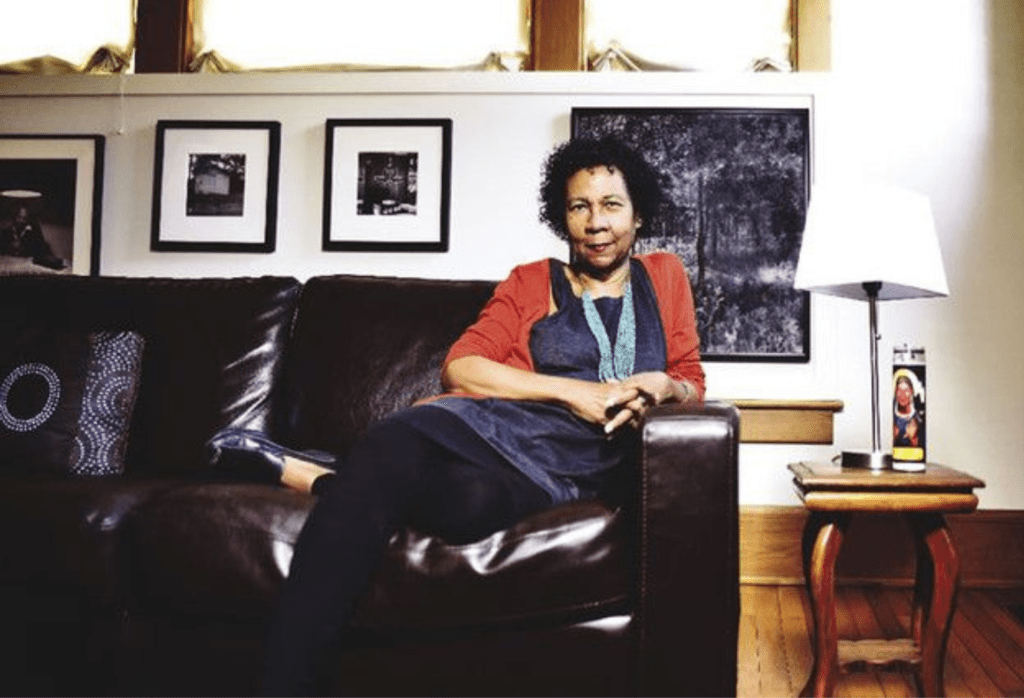One of the twentieth century’s greatest cultural critics, author and activist bell hooks, has died aged 69.
On Wednesday, her niece Ebony Motley tweeted: “The family of @bellhooks is sad to announce the passing of our sister, aunt, great aunt and great great aunt.”
Motley also attached a statement, which explained the family is “…deeply saddened at the passing of our beloved sister on December 15, 2021. The family honoured her request to transition at home with family and friends by her side.”
“The family is honoured that Gloria received numerous awards, honours, and international fame for her works as a poet, author, feminist, professor, cultural critic, and social activist. We are proud to just call her sister, friend, confidant, and influencer.”
Born Gloria Jean Watkins in Hopkinsville, Kentucky in 1952, hooks published more than 30 books in her lifetime, including seminal texts Ain’t I a Woman? Black Women and Feminism, Yearning: Race Gender, and Cultural Politics and Killing Rage: Ending Racism.
Her books stretched across a range of issues including race, feminism, capitalism and intersectionality.
In 1978, she released her first published work, a collection of poems titled And There We Wept, where she changed her name to “bell hooks”.
She adopted her maternal great-grandmother’s name, but used lowercase letters to distinguish herself.
In 1981, hooks’ published her first major work Ain’t I a Woman? one of the most important texts in feminist studies.
hooks wrote Feminist Theory: From Margin to Center in 1984, followed by Talking Back: Thinking feminist, thinking Black: Between the Lines, Yearning: race, gender, and cultural politics and Sisters of the yam: Black women and self-recovery.
In 2000, she published one of her most famous books, All About Love: New Visions, which pairs psychological and philosophical ideas about modern love.
“All too often women believe it is a sign of commitment, an expression of love, to endure unkindness or cruelty, to forgive and forget,” she wrote. “In actuality, when we love rightly we know that the healthy, loving response to cruelty and abuse is putting ourselves out of harm’s way.”
In 2004, she released We Real Cool: Black Men and Masculinity, continuing to draw on themes of gender, feminism, and race.
In the same year, she began teaching at Berea College in Kentucky, a liberal arts college that provides free tuition.
In 2016, hooks made headlines when she criticised Beyoncé’s album Lemonade in the Guardian, calling it “capitalist money-making at its best”.
“To truly be free,” she explained. “…we must choose beyond simply surviving adversity, we must dare to create lives of sustained optimal wellbeing and joy.”
In 2018, at 66, she was inducted into the Kentucky Writers’ Hall of Fame — a list that includes Barbara Kingsolver, Elizabeth Hardwick and Jean Ritchie.
“I want my work to be about healing,” she said at the ceremony to accept the award.
“I am a fortunate writer because every day of my life practically I get a letter, a phone call from someone who tells me how my work has transformed their life.”
Speaking to the Guardian, Margaret Atwood described hooks as a writer who “…embodied amazing courage and deeply felt intelligence.”
“In finding her own words and power, she inspired countless others to do the same,” she said.
“Her dedication to the cause of ending ‘sexism, sexist exploitation and oppression’ was exemplary.”
“Her impact extended far beyond the United States: many women from all over the world owe her a great debt.”
“Through her scholarship and criticism, hooks rewrote our understanding of Black feminism and womanhood, and gave a generation of readers a new way of looking at the world,” New Yorker writer Hua Hsu explained.
“As an Asian American reader, I was enamoured with how critics like hooks drew on their own backgrounds and friendships, not to flatten their lives into something relatably universal but to remind us how we all index a vast, often contradictory array of tastes and experiences.”
hooks’ family announced that donations could be made to the Christian County Literacy Council which promotes reading for children or the Museums of Historic Hopkinsville Christian County where a biographical exhibit of the writer is on display.
Image: Jesse Fox


